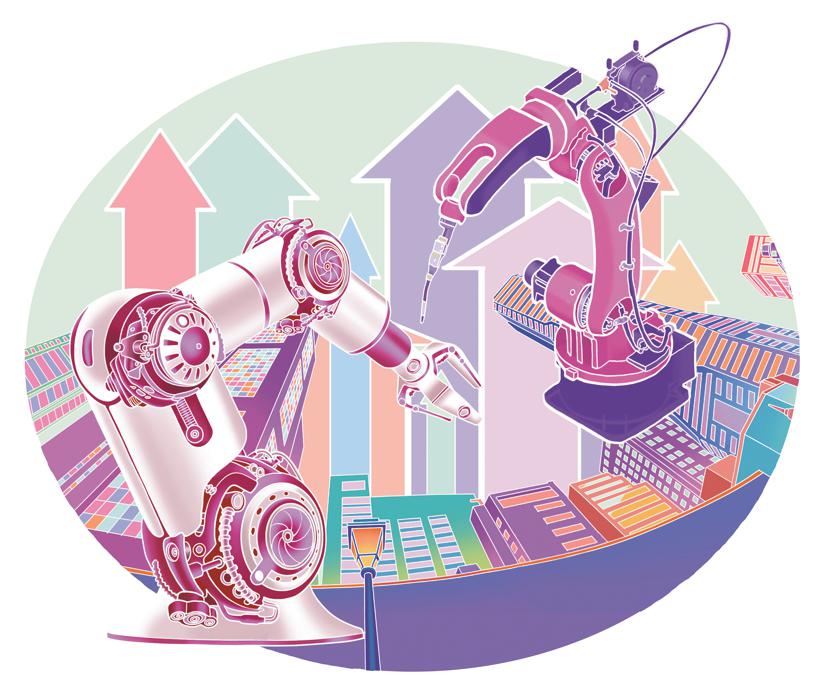Hypotheses about economic decay simply fake news
By John Gong | China Daily | Updated: 2024-04-10 06:41

Three false theories, of late, are being bandied about China's economy in the West. The "stagnation theory" makes an analogy between China's present economic situation and the "lost decade" in Japan. The claim is that China will go down the same path as Japan did in the 1990s, and enter an extended period of stagnation in the coming years.
However, China's economic performance in the first two months of the year tells a story totally different from the "stagnation theory". The three most important industrial sectors — mining, manufacturing and public utilities — grew by 2.3 percent, 7.7 percent and 7.9 percent, respectively. And the four types of enterprises-State-owned enterprises, joint venture companies, foreign companies and domestic companies — grew by 5.8 percent, 7.3 percent, 6.2 percent and 6.5 percent, respectively.
In fact, sectors and enterprises across the board have registered growth, with non-SOEs growing faster than the SOEs. The service sector, too, has registered robust growth as indicated by the National Bureau of Statistics' service activity index — which grew by 5.8 percent.
The consumer price index (CPI) has not shown any movement in the first two months of the year, with the CPI dropping by 0.8 percent in January and increasing by 0.7 percent in February. However, if food and energy prices are excluded, core CPI increased by 0.8 percent in the first two months. These data project anything but a picture of an economy in stagnation, thus consigning the "lost decade" theory to the dustbin of the times.
The second false narrative about the Chinese economy is the "peaking" theory, which postulates that China's GDP growth rate has already peaked and hence it can only slide down now. But China's GDP growth rate has been declining for the past decade — the slide didn't start now.
In economics, there is a "convergence theory" that developed economies' growth rate will eventually drop to a fairly low rate, as it gets increasingly difficult to grow at a fast pace like in the past due to their already huge size and diminishing returns. Very few developed countries can grow consistently above 3 percent for an extended period of time.
This is exactly what has been happening to China's economy since it became the world's second-largest economy and, more importantly, and subsequently more like a developed country. Today, for the Chinese economy to grow at close to a double-digit rate, like it did for three decades since the launch of reform and opening-up, would mean adding $1.5 trillion of GDP every year, which is tantamount to creating an economy almost the size of Australia every year.
How is this possible?
The third narrative is what I call the "export glut" theory, as typified by an article in The New York Times recently that warned that Chinese goods are going to flood global markets after stealing local jobs.
What this theory is aimed at is essentially stoking hatred toward Chinese exports worldwide. China's exports have been subject to much badmouthing and cursing over the years. Earlier, there used to be a theory about Chinese exports running out of steam. But after China's exports grew by a small but still significant rate of 0.6 percent last year amid a slump in global trade, the naysayers started switching gear to warn against the opposite, that is, Chinese exports glut.
The United States played the leading role in establishing the General Agreement on Tariffs and Trade (which later became the World Trade Organization) about 75 years ago. It was the world's largest trading country for decades. It also used to be a champion of free trade.
But today very few politicians in the Beltway talk about free trade. Nor do the traditional Republican ideologues. Instead, they are talking about fair trade and safe trade. Concepts like national security, supply chain resilience and economic sovereignty have gained traction in the US, with some people even promoting ideologically correct or politically correct trade.
This is nothing but hypocrisy on the part of these US politicians. Perhaps they should learn from former president Donald Trump: just say hundreds of billions of dollars were stolen by the Chinese, and then let's have a "civilized debate" on it.
The author is a professor at the University of International Business and Economics and vice-president Research and Strategy at UIBE-Israel. The views don't necessarily reflect those of China Daily.
If you have a specific expertise, or would like to share your thought about our stories, then send us your writings at opinion@chinadaily.com.cn, and comment@chinadaily.com.cn.
























